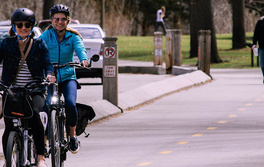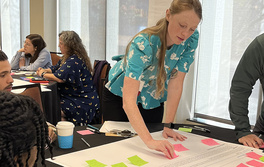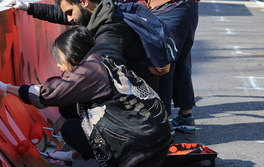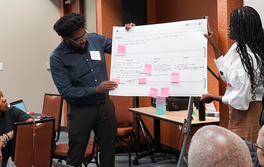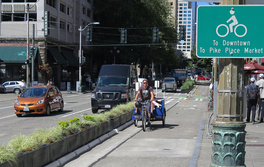
RELEASE: New Database COVID Mobility Works Launches, Catalogs Over 500 Transportation Responses to COVID-19
RELEASE: New COVID Mobility Works Database Identifies Over 500 Global Mobility Responses to COVID-19
Partnership of International NGOs Launches COVID Mobility Works Website to Catalog Transportation Initiatives Responding to Pandemic
Washington, D.C. (June 30, 2020) — A partnership of nonprofit transportation organizations has launched a new digital database of global mobility responses to the public health and safety crisis brought on by the new coronavirus.
COVID Mobility Works is an independent platform dedicated to collecting, synthesizing and sharing mobility initiatives that are keeping the world moving through the COVID-19 crisis and recovery. Recognizing the myriad actions taken to provide safe mobility around the world, the platform is intended to support policymakers, planners, innovators, researchers, service operators and advocates as they rise to the challenge of creating more resilient, inclusive and sustainable transportation systems for all.
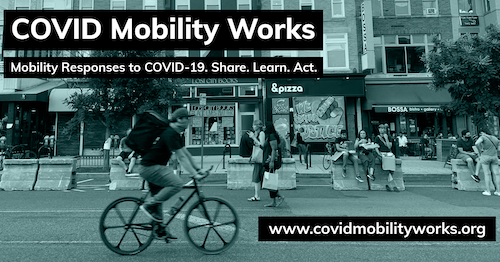
"Organizations of all sizes mobilized rapidly to respond to the transportation-related challenges created by the pandemic, such as curtailed public transit service,” said Harriet Tregoning, director of NUMO. “COVID Mobility Works is an NGO-led effort, in partnership with academia, to collect those responses in a digitally searchable format so they can be easily identified, shared, studied and scaled.”
The platform is the result of a partnership of global nonprofit organizations — including NUMO, the New Urban Mobility alliance; Polis; TNO; TUMI, Transportation Sustainability Research Center; University of California, Berkeley; the Transformative Urban Mobility Initiative; Urbanism Next at the University of Oregon and the World Economic Forum’s Global New Mobility Coalition — dedicated to resilient, inclusive and sustainable mobility for all.
Over 500 responses from nearly 250 cities have been initially collected on COVID Mobility Works, and the partners plan to add new entries monthly through Spring 2021. These responses — ranging from actions taken to safely continue mobility services for essential workers to addressing the provision of transportation services to identifying modifications to critical infrastructure — represent public, private and nongovernmental organization efforts to ensure the movement of people and goods during the novel coronavirus pandemic response and recovery.
“These responses were intended to support public health amid the COVID-19 pandemic and will have a lasting impact long after the crisis subsides,” said Christoph Wolff, head of mobility at the World Economic Forum. “We are at the tipping point of a great reset of our global transportation ecosystem that could usher in a new age of resiliency, inclusivity and sustainability. We hope researchers and operators reflect on the actions taken out of urgency, learn from them and act toward a better tomorrow.”
Learn more at www.covidmobilityworks.org. For media inquiries, please contact Madlyn McAuliffe at madlyn@numo.global.
About NUMO
NUMO, the New Urban Mobility alliance, is a global organization that channels tech-based disruptions in urban transport to create joyful cities where sustainable and just mobility is the new normal. NUMO is hosted by WRI Ross Center for Sustainable Cities.
About the World Economic Forum’s Global New Mobility Coalition
The Global New Mobility Coalition, curated by the World Economic Forum, is an active and diverse community of over 150 globally renowned experts, NGOs and companies dedicated to accelerating the shift to a Shared, Electric and Autonomous Mobility (“SEAM”) system that provides for healthier cities, reduces carbon emissions by 95%, improves mobility efficiency by 70% and decreases commuting costs by 40%, while tapping into a 600 billion-dollar business. Click here for more information.
About Urbanism Next
Urbanism Next, a university research center at the University of Oregon, conducts research and convenes partners from around the globe to build shared understandings of the effects of emerging technologies. Going beyond the technologies themselves, Urbanism Next explores the possible future implications for cities, people, and communities to inform better decision-making today. Click here for more information.
About POLIS
POLIS is the leading European network of cities and regions working on urban transport innovation. Click here for more information.
About TNO
TNO, the Netherlands Organization for applied scientific research, connects people and knowledge to create innovations that boost the sustainable competitive strength of industry and well-being of society. Click here for more information.
About TUMI
TUMI, Transformative Urban Mobility Initiative, is a coalition of nonprofits and intergovernmental organizations devoted to improving mobility systems around the world. Formed through the union of 11 prestigious partners: ADB, GIZ, ITDP, CAF, KFW, C40, ICLAI, SLOCAT, UN Habitat and WRI, TUMI’s partners are united in one mission: changing mobility for the benefit of people and the environment, through three pillars: innovation, knowledge, investment. Click here for more information.
About the University of California, Berkeley Transportation Sustainability Research Center
The University of California, Berkeley’s Transportation Sustainability Research Center (TSRC) studies the economic, social, environmental and technological aspects of sustainable transportation. For more information, visit tsrc.berkeley.edu and innovativemobility.org (a division of TSRC focused on shared and innovative mobility technologies and services).
ADDITIONAL QUOTES
Karen Vancluysen, POLIS
“As a network committed to helping cities and regions navigate these difficult times, we are happy to contribute to the COVID Mobility Works initiative. It is important to show how local authorities in Europe and beyond kept things moving during the lockdown and how urban mobility is being reshaped now that confinement measures are being eased."
Jeroen Borst, TNO
“TNO works on future urban areas to stay easily accessible, livable and sustainable. With this initiative, our organization would like to support the sharing of knowledge across continents and cities striving for no less than zero: Zero Emission, Zero Loss and Zero Casualties.”
Daniel Moser, TUMI
“Coronavirus has brought cities around the world to terms with a much needed catch-up in terms of sustainable infrastructure. Millions of people are already enjoying a more equitable distribution of space by using new cycling highways. Going forward the key task will be to make these changes permanent. With COVID Mobility Works, we offer — together with our partners — a key platform to support policymaking, innovation and research for more sustainable mobility action during this crisis.”
Susan Shaheen, Transportation Sustainability Research Center, University of California, Berkeley
“We are delighted to partner on this exciting and timely digital database to help advance understanding and best practices in response to the COVID-19 pandemic — ranging from immediate response to longer-term recovery efforts. Better understanding of the pandemic’s impacts on public transit, shared mobility and traveler choice is critical to ensuring that we advance social equity and sustainability goals at this challenging time — turning crisis into opportunity.”
Nico Larco, Urbanism Next
“In addition to a health crisis, COVID is also causing ongoing disruptions to cities and regions throughout the globe. We are pleased to be working with our partners on the COVID Mobility Works platform to help both the public and private sectors better understand the near-term and longer-term cascading impacts on cities. This is an important step in preparing for the ‘new normal’ we are all moving toward.”
